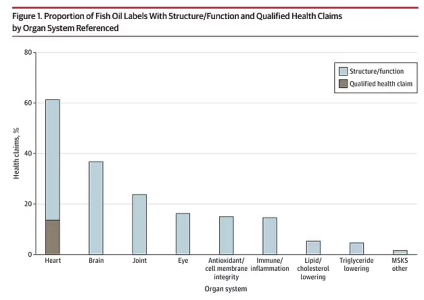Is fish oil a waste of money? Study casts a pall on highly touted health supplements
If you are a regular consumer of fish oil supplements, then there’s something you should know—recent information has come to light about how this industry might be deceiving customers and making billions of dollars in the process.
At face value, fish oil supplements appear incredibly beneficial—promoting gut, joint, eye and general heart health—but a study suggests that these have not been backed up by science.
This is what a study conducted by the University of Texas Southwestern Medical Center (UTSMC) in the United States has revealed: those health claims made by the fish oil industry, worth $2.3 billion globally, are largely unfounded.
The researchers studied 2,819 fish oil supplement labels from the National Institutes of Health Dietary Supplement Database, which catalogues all information printed on labels of dietary supplements sold in the United States.
Out of those studied, 2,082 (73.9 per cent) made health claims and 80.3 per cent of those used structure/function claims.
Structure/function claims broadly describe a health effect made by a substance, such as 'boosts heart health', and must have a disclaimer about how the substance is not intended to diagnose, treat, cure, or prevent any disease.
‘Structure/function claims are allowed by the Food and Drug Administration (FDA), but they can be vague and misleading,’ Dr Navar shared.
‘Structure/function claims can include statements like “supports cognitive health” or “supports healthy joints”. Technically, these cannot be used to claim that the supplement treats or prevents disease, but we feel that this type of language can be very confusing to consumers who may be unaware these statements do not require support from randomised trials,’ she explained.
Carolyn Williams, a registered dietitian in Alabama who was not involved with the study, described structure/function claims as ‘the wild, wild west’.
She said: ‘You can say, "boosts immunity”, "improves brain health”, "boosts heart health”. They're all things that really are impossible to measure. And for some reason, you can say pretty much whatever you want if you're a manufacturer and worded it as a structure/function claim.’
'About one in five Americans over the age of 60 take fish oil supplements, often because they think it is helping their heart,’ Dr Ann Marie Navar, a cardiologist at UTSMC and the lead study author, said.
‘But extensive research has shown that for most people, there is no cardiovascular benefit in taking over-the-counter fish oil supplements, and at high doses, they can even increase the risk of atrial fibrillation,' she continued.
The researchers also conducted test experiments that compared the amount of two crucial omega-3 fatty acids—Eicosapentaenoic Acid (EPA) and Docosahexaenoic Acid (DHA)—in the fish oil supplements.
These acids have been linked to lower blood pressure levels and better immune system functionality, as well as proper fetal development.
These can be found in fatty fish like salmon, herring, sardines, mackerel, trout, oysters, shrimp, tuna, lobster, and algae.
It was found that only 1 out of 10 supplements (among 255 preselected) studied met the proposed EPA and DHA levels needed to lower blood pressure, which is 2,000 to 3,000 milligrams.
‘The fish oil supplements that really have little to no EPA or DHA really can't live up to these claims they're putting on them,' Ms Williams shared.
She also added that the ideal fish oil supplement should have 60 per cent EPA and 40 per cent DHA.
Another study author and medical student, Joanna Assadourian advised consumers to consult their physician about their supplements.
‘Patients should talk to their doctor about what supplements they are taking and why they are taking them—they may be surprised to learn they are not getting the health benefits they think they are,’ she said.
They also called for stricter regulations on dietary supplement labeling, to protect consumers from misinformation.
You can read the full study here.
We shared an article last month about the benefits of taking fish oil supplements compared to eating fish. You can learn more about that here.

Members, it is advisable to talk to your doctor or healthcare professional before taking any supplement to ensure it is the right choice for your health needs.
What’s your take on this, members? Do you take fish oil supplements? Let us know in the comments below!
At face value, fish oil supplements appear incredibly beneficial—promoting gut, joint, eye and general heart health—but a study suggests that these have not been backed up by science.
This is what a study conducted by the University of Texas Southwestern Medical Center (UTSMC) in the United States has revealed: those health claims made by the fish oil industry, worth $2.3 billion globally, are largely unfounded.
The researchers studied 2,819 fish oil supplement labels from the National Institutes of Health Dietary Supplement Database, which catalogues all information printed on labels of dietary supplements sold in the United States.
Out of those studied, 2,082 (73.9 per cent) made health claims and 80.3 per cent of those used structure/function claims.
Structure/function claims broadly describe a health effect made by a substance, such as 'boosts heart health', and must have a disclaimer about how the substance is not intended to diagnose, treat, cure, or prevent any disease.
‘Structure/function claims are allowed by the Food and Drug Administration (FDA), but they can be vague and misleading,’ Dr Navar shared.
‘Structure/function claims can include statements like “supports cognitive health” or “supports healthy joints”. Technically, these cannot be used to claim that the supplement treats or prevents disease, but we feel that this type of language can be very confusing to consumers who may be unaware these statements do not require support from randomised trials,’ she explained.
Carolyn Williams, a registered dietitian in Alabama who was not involved with the study, described structure/function claims as ‘the wild, wild west’.
She said: ‘You can say, "boosts immunity”, "improves brain health”, "boosts heart health”. They're all things that really are impossible to measure. And for some reason, you can say pretty much whatever you want if you're a manufacturer and worded it as a structure/function claim.’
'About one in five Americans over the age of 60 take fish oil supplements, often because they think it is helping their heart,’ Dr Ann Marie Navar, a cardiologist at UTSMC and the lead study author, said.
‘But extensive research has shown that for most people, there is no cardiovascular benefit in taking over-the-counter fish oil supplements, and at high doses, they can even increase the risk of atrial fibrillation,' she continued.
The researchers also conducted test experiments that compared the amount of two crucial omega-3 fatty acids—Eicosapentaenoic Acid (EPA) and Docosahexaenoic Acid (DHA)—in the fish oil supplements.
These acids have been linked to lower blood pressure levels and better immune system functionality, as well as proper fetal development.
These can be found in fatty fish like salmon, herring, sardines, mackerel, trout, oysters, shrimp, tuna, lobster, and algae.
It was found that only 1 out of 10 supplements (among 255 preselected) studied met the proposed EPA and DHA levels needed to lower blood pressure, which is 2,000 to 3,000 milligrams.
‘The fish oil supplements that really have little to no EPA or DHA really can't live up to these claims they're putting on them,' Ms Williams shared.
She also added that the ideal fish oil supplement should have 60 per cent EPA and 40 per cent DHA.
Another study author and medical student, Joanna Assadourian advised consumers to consult their physician about their supplements.
‘Patients should talk to their doctor about what supplements they are taking and why they are taking them—they may be surprised to learn they are not getting the health benefits they think they are,’ she said.
They also called for stricter regulations on dietary supplement labeling, to protect consumers from misinformation.
You can read the full study here.
We shared an article last month about the benefits of taking fish oil supplements compared to eating fish. You can learn more about that here.
Key Takeaways
- Most fish oil supplements make health claims that science doesn't back up, with a US study suggesting that 74 per cent of these supplements make broad claims like 'supporting heart health'.
- There's a risk of cardiovascular issues, like atrial fibrillation, with high doses of fish oil supplements.
- Research indicated that only one in ten of the studied supplements met the recommended
daily amount of two key omega-3 fatty acids, Eicosapentaenoic Acid (EPA) and Docosahexaenoic Acid (DHA).
- Experts warn that the structure/function claims made by fish oil supplement labels could be misleading to consumers as these claims are not regulated or scientifically validated.
Members, it is advisable to talk to your doctor or healthcare professional before taking any supplement to ensure it is the right choice for your health needs.
What’s your take on this, members? Do you take fish oil supplements? Let us know in the comments below!









